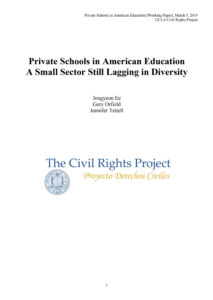This is 1 of 4 studies (working papers) presented on March 5, 2018 on Capitol Hill at a briefing, “Bringing Civil Rights Research to Bear on Voucher Programs: Are the Promises Realized?”
SUMMARY
The past fifteen years have seen an explosion of private school voucher programs. Half of US states now have some type of program that spends or otherwise subsidies private schooling. Yet most civil rights protections that students enjoy when they attend public schools do not follow them to private schools. Some state voucher laws include no protections or only the most basic protections against discrimination. Even the most protective laws include no safeguards against LGBTQ discrimination and no requirement of addressing the needs of students not fluent in English. Further, these laws contain few or no requirements that private schools meet the needs of students with disabilities, and many explicitly state that students waive their services and protections under the Individuals with Disabilities Education Act (IDEA) when choosing to use a voucher.
At a time when the Trump administration and many state policy-makers are pushing for additional growth of voucher policies, it is useful to consider how the shifting schooling landscape impacts such civil rights protections. The basic tendency in the development of voucher law and policy is to initially justify the subsidies in terms of the severe educational needs of students of color and students in poverty attending inferior public schools. As the policies develop, they increasingly move toward general subsidies for private schooling, including support for higher income groups and students who have never attended public schools. Many of the state restrictions on funding nonpublic or religious institutions have been interpreted away by state courts. These trends call into question the ability of voucher programs to serve the vulnerable student populations for whom they were ostensibly created.
In this report, we first detail the evolution of voucher policies, from their roots in the Jim Crow Era to their modern-day applications, including the rise of “neovoucher” programs. Next, we examine past legal challenges to vouchers, concluding that both state and federal constitutional challenges have had very limited success but that there likely remain some future legal impediments to voucher expansion. We discuss factors that may influence the legal justifications of vouchers, including the quality of education for students of color in voucher programs. Following this, we delve into some key policy issues that arise from this shift toward greater public funding of private schools, with a particular focus on civil rights concerns. We conclude with a set of recommendations, again focused on civil rights protections.
These recommendations include:
- Ensuring that state voucher laws include straightforward anti-discrimination provisions that require voucher-accepting private schools to avoid engaging in discrimination on the basis of race, religion, color, national origin, sex, disability, or sexual orientation
- Providing stronger protections for disabled students by requiring voucher-accepting private schools to comply with Section 504 of the 1973 Rehabilitation Act and the IDEA
- Securing better services for ESL students by requiring voucher-accepting private schools to comply with the Equal Education Opportunity Act of 1974
- Addressing barriers that impede access for low-income students, including lack of transportation, additional tuition charges beyond the value of the voucher, and private schools’ option not to participate in subsidized meal programs
In compliance with the UC Open Access Policy, this report has been made available on eScholarship:
